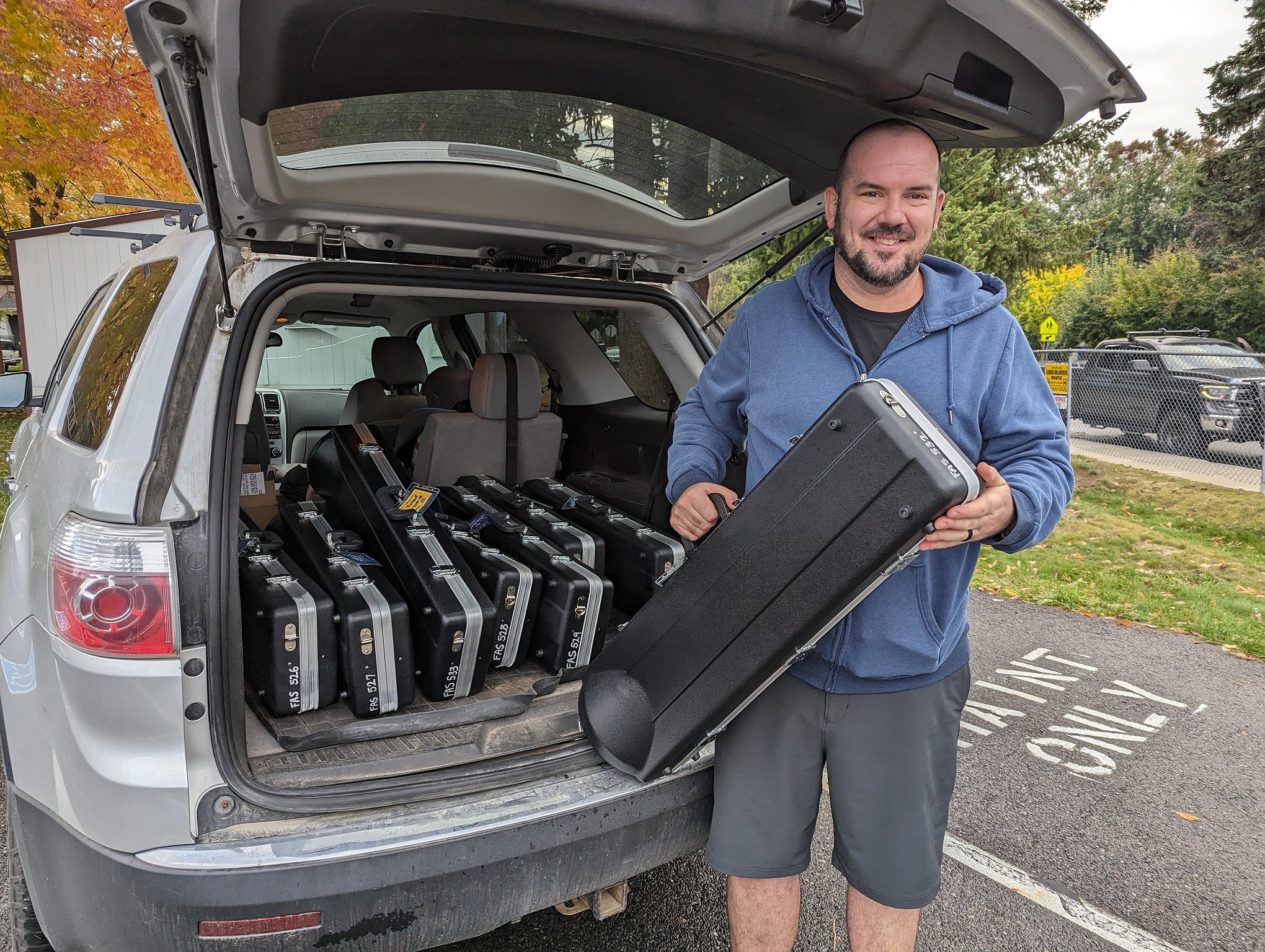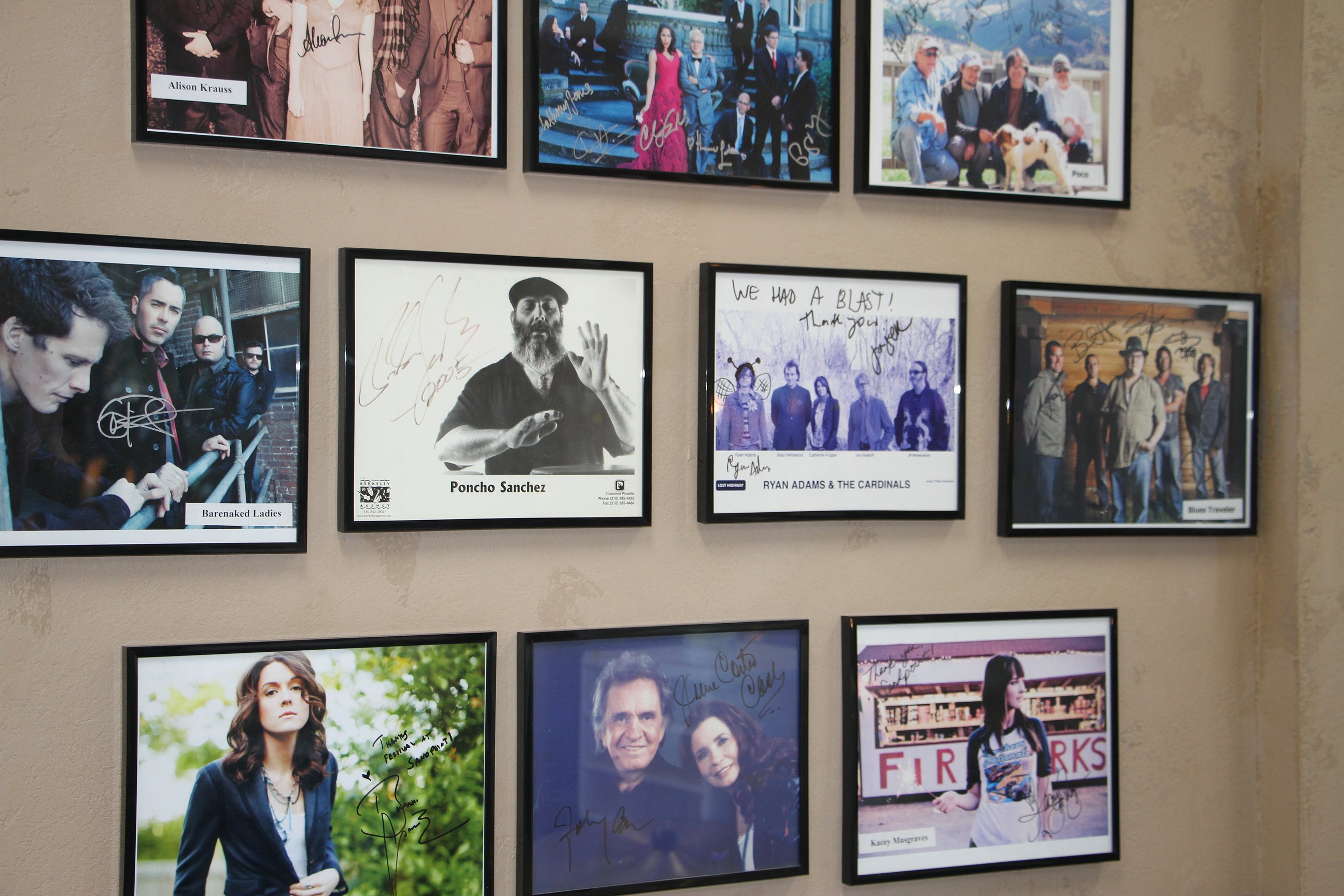Making music — a backstage look at how the Festival at Sandpoint hosts 20,000 concertgoers each summer
For most of the year, south Sandpoint is quiet. It’s a neighborhood of single-family homes, and the streets are lined with mature hardwoods and ponderosa pines. The houses run up to Ontario Street and face War Memorial Field — home of the Sandpoint High School baseball, football, and soccer teams — and the west arm of Lake Pend Oreille.
For a two-week period each summer, the area is radically transformed. Street food vendors arrive, tour buses roll in, and more than 20,000 music fans gather at the turf stadium for a series of performances from premier artists like Brandi Carlile, ZZ Top, and Johnny Cash.
How does a high school sports field in a residential neighborhood become a venue for one of the Northwest’s preeminent concert series?
The Festival at Sandpoint, the non-profit behind the annual event, has hosted more than 100 acts since 1983. According to Cienna Roget, marketing and office manager, the organization aims for its work to go undetected.
“If we’ve done our jobs correctly, people will not notice or have anything to complain about,” said Roget.
“It’s similar to the airport — if the airport has done things correctly, you should just fly through TSA, have your ticket ready, and go on your plane,” Roget explained. “But of course, things happen.”
The Festival’s full-time staff of six works year-round to prepare for each summer concert series. Artists are often booked close to 12 months ahead of a performance, and there are endless tasks to prepare for the influx of visitors.
During each festival, it’s all hands on deck for staff members. While seasonal employees and volunteers play key roles, the task of managing operations falls on the staff.
“I go to bed, I think about the festival. I wake up, I think about the festival,” Roget said with a laugh. “It's all my brain can think about.”
As marketing manager, one of Roget’s major challenges is making sure concertgoers receive critical information. This includes designing queues, placing signs, and stationing volunteers to answer questions.
“Line setup is a whole category,” Roget said. “How do I funnel people through here so that they see this sign and understand this?”
Roget also handles the brunt of customers’ problems and complaints — many of which are connected to an industry-wide issue plaguing event hosts.
“We have a lot of scammers,” said Roget. As ticket sales have moved almost exclusively online, fraudsters have taken to digital marketplaces like StubHub and Vivid Seats to sell fake passes to unsuspecting consumers.
Because secondary sites pay for search engine advertisements, customers often land on risky pages when searching for event tickets.
“If you look up any of our acts, the first three to four links are not us,” Roget said. “We also pay for ads, but as a nonprofit, we don't have the kind of money they do.”
According to Roget, ticket scams hurt both customers and venues. In a July 9 Facebook post, the Festival at Sandpoint voiced support for the Fans First Act, a bill introduced in the U.S. Senate last December that aims to increase transparency and accountability in the ticketing industry.
“It's just a thing we can't prevent, unfortunately,” said Roget. “Sometimes, people will drive three-plus hours, arrive at the venue, and not have a real ticket and I can't sell them one. It's just heartbreaking.”
Roget’s best advice is to choose ticketing sites carefully. “My recommendation is to either go to the venue’s website or the artist’s website and buy tickets there,” she said.
In addition to helping customers, Roget’s other primary task is coordinating the army of volunteers needed to put on the concert series.
“Last year, we had 600 unique volunteers,” Roget said. With hundreds of shifts each night and 20 different departments, managing the massive crew of workers is a daunting task.
“Making sure that they get their schedules filled is huge,” explained Roget. “It's kind of like a puzzle — this volunteer has these skills, they're only available at these times on these days.”
She added that most of the volunteers are from Bonner County, and that residents as young as 14 and as old as 70 lend their time. “It's definitely a huge community effort,” said Roget.
While managing 20,000 visitors is a mammoth task, it’s equally difficult to turn a football field into a professional venue for touring musicians. Paul Gunter, production and education manager at the nonprofit, shed some light on his greatest obstacles ahead of the concerts.
“The biggest challenge we face for production is being a pop-up venue,” said Gunter. Because War Memorial Field is primarily an athletic facility, there’s little infrastructure for hosting musical events. “Nothing that we use here is permanently installed for us except for the power,” he added.
To transform the venue, Gunter and his team must retrieve equipment from storage and reserve and receive rental gear. When the Festival retired its iconic bandshell tent ahead of last year’s summer series, the staff were forced to begin leasing a more modern stage.
According to Gunter, there’s a five to seven-year waiting list to purchase the type of stage the summer concert series needs. Last year, the rented stage came from Washington, but limited availability this year forced Gunter to organize the transport of a stage from Arizona.
Gunter estimated the cost of leasing the stage to be about $50,000, not to mention the protective equipment needed to prevent the turf field from being damaged.
“That cost us a pretty penny as well,” he said.
Gunter has a long history of involvement with the Festival. After starting as a member of the production crew in 1999 when he was in high school, he became the seasonal site manager before taking on his current role in 2019.
While Gunter has witnessed countless festival shows over the years, one performance stuck out to him as being especially memorable. When a set from Lake Street Dive was delayed by a thunderstorm, much of the audience departed.
“After we were allowed to bring people back in, there were only about 400 people that stayed,” Gunter recalled. “It became this very intimate show all of a sudden.”
When the band began to play again, something special happened. “Everybody was up on their feet dancing,” said Gunter. “It was still just crushing rain the entire time,” he added. “It was one of those things that you don't usually get to see at other venues.”
Before becoming a full-time staff member for the Festival, Gunter taught band, music, and choir classes in Lake Pend Oreille School District and at Forrest M. Bird Charter School. He describes himself as a “lifelong musician,” and is a multi-instrumentalist in Right Front Burner, one of Sandpoint’s most beloved local bands.
In addition to overseeing the production of the summer concert series, he also manages the year-round outreach and education programs put on by the organization. The nonprofit hosts an ongoing masterclass program, provides scholarships to local students studying music and the arts, and offers free rentals through its band and orchestra instrument library.
“It's cool to be on the education side of music and the live production side of music,” said Gunter. “This is a very cool organization to have in Sandpoint, outside of the series that we do.”
Ultimately, the challenges faced by the Festival at Sandpoint are directly connected to what makes the summer concert series special. The neighborhood environment of the event creates an atmosphere distinct from that of larger, more corporate venues.
Roget grew up in Sandpoint and enjoyed the summer concert series long before joining the staff of the Festival. She graduated from high school in the same stadium that hosts world-class musicians and lives only a couple of blocks away from the venue.
“It's foreign to have a concert in the middle of your neighborhood.” Roget said. “I didn't know that growing up until I moved away for a little bit.”
Even when community members depart Sandpoint, the summer shows have a way of reconnecting people.
“I see people from high school that don't live here. They still come back for it,” Roget said. “It's kind of like a weird family reunion.”
The Festival at Sandpoint has a simple goal — to make music as accessible as possible. By providing scholarships, organizing outreach programs, providing instruments for community members, and hosting premier musicians, the organization is ensuring that each and every year, Sandpoint stays musical.
“We always try to have something for everybody. We try to keep our ticket prices low,” said Roget. “We think it's really important to get to do this and get to do this in Sandpoint.”







